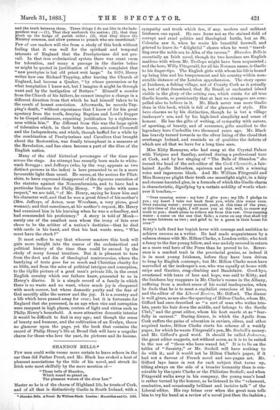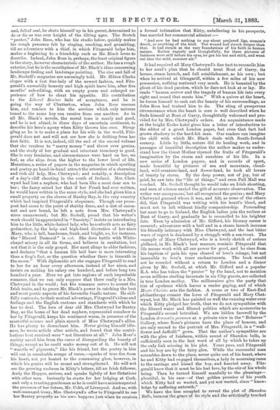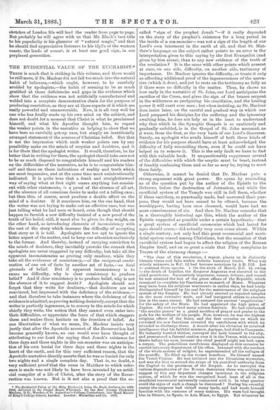SHAND ON BELLS.*
FEW men could write verses more certain to leave echoes in the ear than did Father Front, and Mr. Black has evoked a host of pleasant associations by the title of his novel, and struck its Irish note most skilfully by the mere mention of-
" Those bells of Shandon, Which sound so grand on The pleasant waters of the river Lee."
Master as he is of the charm of Highland life, he treats of Cork, and of all that is distinctively Gaelic in South Ireland, with a
* ShandonBells. A.Novel. By WilliamBlack. London: Macmillan and Co. less.
sympathy and truth which few, if any, modern and militant Irishmen can equal. He sees Ierne not as the stained field of corrupt and cruel politics and theological battle, but as St. Colomba saw it, when he wrote his beautiful farewell, and grieved to leave its " delightful " shores when he went "travel- ling over the noble sea to Alba of the ravens." Shanelon Bells is essentially an Irish novel, though its two heroines are English maidens with whom Mr. Trollope might have been acquainted ; and the hero, Willy Fitzgerald, for all his Norman name, is Gaelic to his finger-tips. The English girls with whom his life is bound up bring him and his temperament and his country within mea- surable distance of the London apprehension. The story opens at Inisheen, a fishing village, not of County Cork as it actually is, but of that dreamland, that Hy Brasil, or enchanted island visible in the glory of the setting sun, which exists for all true Gaelic hearts, so persistently that at last we strangers are com- pelled also to believe in it. Mr. Black never was more Gaelic than in this book, which is fall of the glamour of style. His hero charms us by his distinction, though be is but a village innkeeper's son, and by his high-bred simplicity and sense of honour. He has the gifts of writing, of sympathy with nature, of sporting, of beauty, and of reverence, gifts ascribed to the legendary hero Cuchullin two thousand years ago. Mr. Black has bravely turned towards us the silver lining of the cloud that overhangs Ireland, and reminds us of qualities the defects of which are all that we have for a long time seen.
Miss Kitty Romayne, who had sung at the Crystal Palace with Tietjens and Santley, arrived during a professional tour at Cork, and by her singing of "The Bells of Shandon " she turned the head of the sub-editor of the Cork Chronicle, a fair- haired Apollo Belvedere, squireen and poet, with a winning voice and ingenuous blush. And Mr. William Fitzgerald and Miss Romayne plight their troth one moonlight night, in a fairy and stream-haunted glen, in a formula of which the Gaelic charm is characteristic, dignifying by a certain nobility of words what- ever it touches,—
"Over running water : my love I give you ; my life I pledge to you ; my heart I take not back from you, while this water runs. Over running water : every seventh year, at this time of the year, at this time of the night, I will meet you at this well, to renew my troth to you ; death alone to relieve me from this vow. Over running water : a curse on the one that fails ; a curse on any that shall try to come between us two ; and grief to be a guest in their house for ever."
Kitty's talk fired her boyish lover with courage and ambition to achieve success as a writer. He had made acquaintance by a salmon stream with Mr. Hilton Clarke, a London critic, who took a fancy to the fine young fellow, and was unduly revered in return. as a more real hero of the Press than he proved to be. Rever- ence is a marked trait in the provincial genius, as indeed it is in most young Irishmen, before they have been driven to brag by English contempt; but Mr. Hilton Clarke must have marvelled at the innkeeper's son, who was equally at home with snipe and Gautier, crag-climbing and Bandelaire. Good-bye, sweetened with tears of love and hope, was said to Kitty, and the Inisheen boy reappears in Mr. Clarke's rooms in the Albany, suffbring from a modest sense of his social inadequacies, when he finds that he is to meet a capitalist conscious of his purse, and the editor of the Liberal Review, Mr. Gifford. The dinner is well given, as are also the sparring of Hilton Clarke, whom Mr.. Gifford had once described as "a sort of man who writes trio- lets, parts his hair down the middle, and belongs to the Savile Club," and the great editor, whom his host snarls at as "fear- fully in earnest." During dinner, in which the Apollo from Cork suffers the pains of education in caviare, olives, and other acquired tastes, Hilton Clarke starts his scheme of a weekly paper, for which he wants Fitzgerald's pen, Mr. Scobell's money: and Mr. Gifford's good word. It should be called Jeshurun, the great editor suggests, not without scorn, as it is to be suited to the use of "those who have waxed fat." It is to lie on the tables of " Sassiety," or Mr. Scobell will have nothing to do with it; and it would not be Hilton Clarke's paper, if it had not a flavour of French novel and neo-pagan art. Mr. Gifford lays lance in rest for each subject that turns up, tilting always on the side of a broader humanity than is con- ceivable by the cynic Clarke or the Philistine Scobell ; and when Fitzgerald walks away in his company, the young man's head is rather turned by the honour, as he listened to the "vehement, combative, and occasionally brilliant and incisive talk" of the Liberal editor. His cup brims over when the great man tells him to try his hand at a review of a novel just then the fashion;
and, full of zeal, he shuts himself up in his garret, determined to do or die as was ever knight of the tilting ages. The Scotch "penter," John Ross, who has his studio below, quickly makes his rough presence felt by singing, smoking, and grumbling, till an adventure with a thief, in which Fitzgerald helps him, makes a beginning to a friendship such as Mr. Black loves to describe. Indeed, John Ross is, perhaps, the least original figure in the story, however characteristic of the author. He has a rough exterior, but he is the mouthpiece of Mr. Black's ideas concerning landscape feeling and landscape painting. The rise and fall of Mr. Scobell's magazine are amusingly told. Mr. Hilton Clarke elopes with a fast fine-lady of the newest fashion, and Fitz- gerald's unworldly honesty and high spirit leave him, after five months' sub-editing, with an empty parse and enlarged ex- perience of how to cheat his appetite. His contribution to the Liberal .Review fails of acceptance, and he is going the way of Chatterton, when John Ross rescues him, and renders to him the services which only natures tuned to the same key can receive from one another. As in all Mr. Black's novels, the moral tone is manly and good, and he is not afraid, in these days of uncertain sentiment, to describe his hero's agony when Kitty throws him over. Strug- gling as he is to make a place for his wife in the world, Fitz- gerald does not and will not see how she is drifting from her first faith. It is not, indeed, till the end of the second volume that she resolves to "marry money" and throw over genius, and the study of her gradual and reluctant treachery is good. She is very feminine, and circumstances were hard on her, we feel, as she slips from the higher to the lower level of life. Meantime, a series of papers in the magazine in which sporting and poetry go hand-in-hand attract the attention of a charming and rich old lady, Mrs. Chetwynd ; and notably, a description of a day's cliff shooting in the south of Ireland. Mrs. Chet- wynd had lost a nephew, who had been like a most dear son to her ; the fancy seized her that if her Frank had ever written, he would have written in the same style, and she had given him a small property on the shores of Bantry Bay, in the very country which had inspired Fitzgerald's eloquence. Though our prose- poet had come to the point of shabby dress, and a diet of cocoa- nut and new bread, he left a note from Mrs. Chetwynd's niece unanswered; but Mr. Scobell, proud that his writer's work should be appreciated in " Sassiety," insists on introducing him to the little, white-haired lady, who henceforth acts as fairy godmother, by the help and high-bred discretion of her niece Mary, who is tall, handsome, frank, and bright, as, for instance, the "Blessed Damozel" is not. She does battle with White- chapel misery in all its forms, and believes in sanitation, but not that it is the only gospel. Her aunt clings to older fashions, and declares "that a human life laid bare is more interesting than a frog's foot, or the question whether there is bismuth in the moon." With diplomatic art she engages Fitzgerald to read to her for an hour every afternoon, instead of her niece, and insists on making his salary one hundred, and before long two hundred a year. Here we get into regions of such improbable romance, that we can only suppose that there really is a Mrs. Chetwynd in the world ; but the romance serves to accent the Irish traits, and to prove Mr. Black's power in catching the best and most poetic aspects of his favourite Gaelic nature. He skil- fully contrasts, to their mutual advantage, Fitzgerald's ideas and feelings and the English customs and standards with which he has to deal. The love of dear old Mrs. Chetwynd for Bantry Bay, as the home of her dead nephew, represented somehow to her by Fitzgerald, keeps his sentiment warm, in presence of the masterful science and plain speech of Miss Chetwynd's allies. He has plenty to disenchant him. Never giving himself idle- ness, he wrote article after article, and found that the contri- bntions best received were " not literature at all." John Ross's society saved him from the curse of disregarding the beauty of things, except as he could make money out of it. He will not " warstle wi' pigments," like his friend, but the poetry in him will out in unsaleable scraps of verse,—sparks of trae fire from his heart, not yet heated to the consuming glow, however, in which his genius will be recast and strengthened. He will not see the growing coolness in Kitty's letters, till an Irish follower, Andy the Hopper, arrives, and speaks lightly of her flirtations with other men. Instantly he starts for her lodging at Cork, and only a trusting gentleman as he is could have misinterpreted the presence of her future, Mr. Cobb, of Liverpool. And so, with well-managed irony, Mrs. Chetwynd's offer to Fitzgerald to use
her Bantry property as his own happens just when he receives
a formal intimation that Kitty, unbelieving in his prospects has married her commercial admirer :— "And now he had nothing to say about perjured lips, women's deceit, or anything of the kind. The wound had struck deeper than that. It had struck at the very foundations of his faith in human nature. Rather vaguely and thoughtfully, for these pictures of Inisheen were still before his eyes, he got his hat and stick, and went out into the mild, summer air."
It had required all Mary Chetwynd's fine tact to reconcile him to her aunt's plan that he should treat Boat of Garry, its horses, steam launch, and full establishment, as his own ; but when he arrived at Glengariff, within a few miles of his new possession, nothing mattered very much. He is haunted by the ghost of his dead passion, which he dare not look at or lay. He reads "human sorrow and the tragedy of human life into every sight and sound that meets him." With a quiver at the heart, he forces himself to seek out the beauty of his surroundings, as John Ross had trained him to do. The sting of prosperous circumstance when the heart is sore is well described when he finds himself at Boat of Garry, thoughtfully welcomed and pro- vided for by Mrs. Chetwynd's orders. An acquaintance made at the bright Eccles hotel gives him a letter of introduction to the editor of a great London paper, but even that fact had grown shadowy to the hard-hit man. Oar readers can imagine the skill with which Mr. Black deals with South-Ireland scenery. Little by little, nature did its healing work, and in 'passages of beautiful description the author makes us under- stand how the Great Mother ripened the fruits of Fitzgerald's imagination by the storm and sunshine of his life. In a new series of London papers, and in records of sport, made beautiful by pictures of sea and mountain, cloud- land, wild-creature-land, and flower-land, he took all lovers of beauty by storm. By the deep power, not of joy, but of grief, he saw into the "life of things," and even Pall Mall was touched. Mr. Scobell thought he would take an Irish shooting, and men of science envied the gift of accurate observation. The writer was anonymous; but all recognised the genius ; and Mary Chetwynd guessed whose it was, and felt, as none of the others did, that Fitzgerald was writing with his heart's blood, and must not be left without kindly companionship. Persuading her aunt to go to Ireland, the English ladies join the recluse at Boat of Garry, and gradually he is reconciled to his brighter fate. Even by admission of Mr. Gifford, his literary career is assured ; adventures with a bull and in a steam launch increase his friendly intimacy with Miss Chetwynd, and the last bitter wave of regret is deadened by a straggle with a sea-trout. The example of Mary Chetwynd, who is a lovely sketch of serious girlhood, in Mr. Black's best manner, reminds Fitzgerald that life means work with all our power for good, and he rises from his baptism of pain his eyes cleared of love's mirage, but not insensible to love's truer enchantments. The book would not be rounded without a return to London and a dinner given by Mr. Scobell, at which Mr. Gifford and a popular RA. who has taken the " penter " by the hand, not to mention seven millions sterling incarnate in six City guests, are collected in true London motley. The millionaires give the party that tint of opulence which leaves a reader gaping, and of which Monte Christo sets the fashion. A scene or two of East-End philanthropy cement the loves of Fitzgerald and Mary Chet.. wynd, but Mr. Black has painted so well the running water over which Kitty pledged her troth, that we do not sympathise with the filtered water and filtered politics which are accessories to Fitzgerald's second betrothal. We are bidden farewell by the London dramatis personce at a private view in the " Bolsover " Gallery, where Ross's pictures have the place of honour, and are only second to the portrait of Mrs. Fitzgerald, in a "wall- flower and daffodil" gown. That the author's sympathies are with the glen of Inisheen, within sound of Shandon bells, is sufficiently seen in the last word of all by which he takes up the only link missing in his plot. Years pass, and Fitzgerald and his boy are by the fairy glen. While the successful man scrambles down to the place, never quite out of his heart, where he and Kitty had engaged themselves, a lady in mourning came to the carriage and kissed the boy, and hurried away. Fitz-
gerald knew that it must be his lost love, by the stir of his whole being. Then he turned himself manfully to the gleanings— plentiful, in his case—of that golden promise of his youth which Kitty had so wasted, and yet not wasted, since "know-
ledge by suffering entereth."
We have the less scrupled to reveal the plot of Slaandon Bells, because the grace of its style and the artistically touched
sketches of London life will lead the reader from page to page. But probably he will agree with 'us that Mr. Black's best title to his popularity is his glamour of "natural magic," and that he should find appreciative listeners to his idylls of the western coasts, the lands of sunset, is at least one good sign, in our perplexed generation.




































 Previous page
Previous page